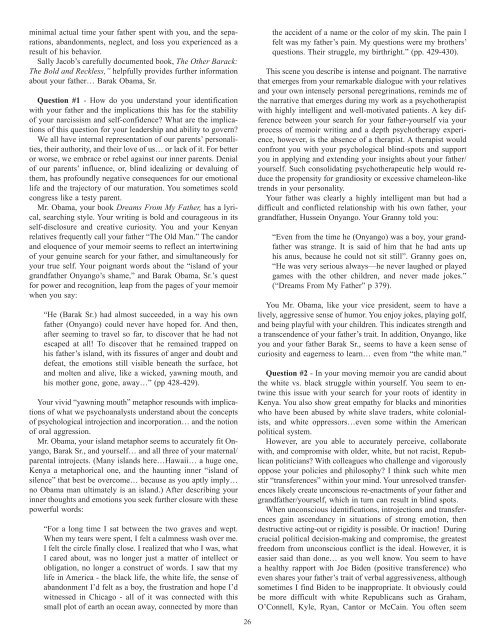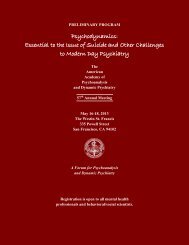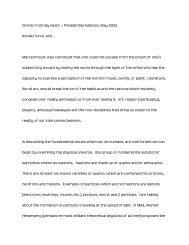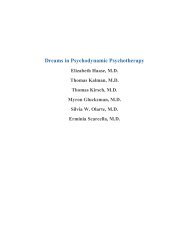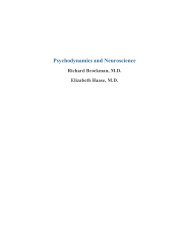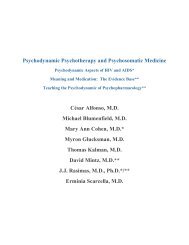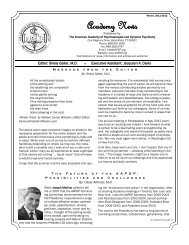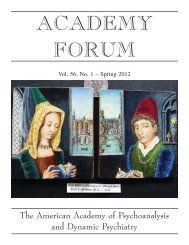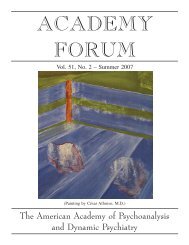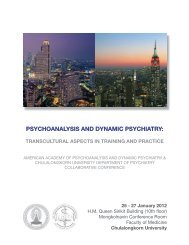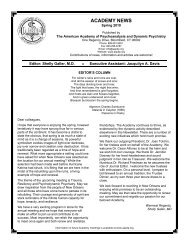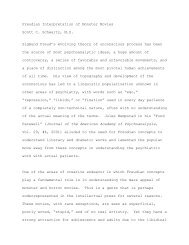ACADEMY FORUM - The American Academy of Psychoanalysis and Dynamic ...
ACADEMY FORUM - The American Academy of Psychoanalysis and Dynamic ...
ACADEMY FORUM - The American Academy of Psychoanalysis and Dynamic ...
You also want an ePaper? Increase the reach of your titles
YUMPU automatically turns print PDFs into web optimized ePapers that Google loves.
minimal actual time your father spent with you, <strong>and</strong> the separations,<br />
ab<strong>and</strong>onments, neglect, <strong>and</strong> loss you experienced as a<br />
result <strong>of</strong> his behavior.<br />
Sally Jacob’s carefully documented book, <strong>The</strong> Other Barack:<br />
<strong>The</strong> Bold <strong>and</strong> Reckless,” helpfully provides further information<br />
about your father… Barak Obama, Sr.<br />
Question #1 - How do you underst<strong>and</strong> your identification<br />
with your father <strong>and</strong> the implications this has for the stability<br />
<strong>of</strong> your narcissism <strong>and</strong> self-confidence What are the implications<br />
<strong>of</strong> this question for your leadership <strong>and</strong> ability to govern<br />
We all have internal representation <strong>of</strong> our parents’ personalities,<br />
their authority, <strong>and</strong> their love <strong>of</strong> us… or lack <strong>of</strong> it. For better<br />
or worse, we embrace or rebel against our inner parents. Denial<br />
<strong>of</strong> our parents’ influence, or, blind idealizing or devaluing <strong>of</strong><br />
them, has pr<strong>of</strong>oundly negative consequences for our emotional<br />
life <strong>and</strong> the trajectory <strong>of</strong> our maturation. You sometimes scold<br />
congress like a testy parent.<br />
Mr. Obama, your book Dreams From My Father, has a lyrical,<br />
searching style. Your writing is bold <strong>and</strong> courageous in its<br />
self-disclosure <strong>and</strong> creative curiosity. You <strong>and</strong> your Kenyan<br />
relatives frequently call your father “<strong>The</strong> Old Man.” <strong>The</strong> c<strong>and</strong>or<br />
<strong>and</strong> eloquence <strong>of</strong> your memoir seems to reflect an intertwining<br />
<strong>of</strong> your genuine search for your father, <strong>and</strong> simultaneously for<br />
your true self. Your poignant words about the “isl<strong>and</strong> <strong>of</strong> your<br />
gr<strong>and</strong>father Onyango’s shame,” <strong>and</strong> Barak Obama, Sr.’s quest<br />
for power <strong>and</strong> recognition, leap from the pages <strong>of</strong> your memoir<br />
when you say:<br />
“He (Barak Sr.) had almost succeeded, in a way his own<br />
father (Onyango) could never have hoped for. And then,<br />
after seeming to travel so far, to discover that he had not<br />
escaped at all! To discover that he remained trapped on<br />
his father’s isl<strong>and</strong>, with its fissures <strong>of</strong> anger <strong>and</strong> doubt <strong>and</strong><br />
defeat, the emotions still visible beneath the surface, hot<br />
<strong>and</strong> molten <strong>and</strong> alive, like a wicked, yawning mouth, <strong>and</strong><br />
his mother gone, gone, away…” (pp 428-429).<br />
Your vivid “yawning mouth” metaphor resounds with implications<br />
<strong>of</strong> what we psychoanalysts underst<strong>and</strong> about the concepts<br />
<strong>of</strong> psychological introjection <strong>and</strong> incorporation… <strong>and</strong> the notion<br />
<strong>of</strong> oral aggression.<br />
Mr. Obama, your isl<strong>and</strong> metaphor seems to accurately fit Onyango,<br />
Barak Sr., <strong>and</strong> yourself… <strong>and</strong> all three <strong>of</strong> your maternal/<br />
parental introjects. (Many isl<strong>and</strong>s here…Hawaii… a huge one,<br />
Kenya a metaphorical one, <strong>and</strong> the haunting inner “isl<strong>and</strong> <strong>of</strong><br />
silence” that best be overcome… because as you aptly imply…<br />
no Obama man ultimately is an isl<strong>and</strong>.) After describing your<br />
inner thoughts <strong>and</strong> emotions you seek further closure with these<br />
powerful words:<br />
“For a long time I sat between the two graves <strong>and</strong> wept.<br />
When my tears were spent, I felt a calmness wash over me.<br />
I felt the circle finally close. I realized that who I was, what<br />
I cared about, was no longer just a matter <strong>of</strong> intellect or<br />
obligation, no longer a construct <strong>of</strong> words. I saw that my<br />
life in America - the black life, the white life, the sense <strong>of</strong><br />
ab<strong>and</strong>onment I’d felt as a boy, the frustration <strong>and</strong> hope I’d<br />
witnessed in Chicago - all <strong>of</strong> it was connected with this<br />
small plot <strong>of</strong> earth an ocean away, connected by more than<br />
the accident <strong>of</strong> a name or the color <strong>of</strong> my skin. <strong>The</strong> pain I<br />
felt was my father’s pain. My questions were my brothers’<br />
questions. <strong>The</strong>ir struggle, my birthright.” (pp. 429-430).<br />
This scene you describe is intense <strong>and</strong> poignant. <strong>The</strong> narrative<br />
that emerges from your remarkable dialogue with your relatives<br />
<strong>and</strong> your own intensely personal peregrinations, reminds me <strong>of</strong><br />
the narrative that emerges during my work as a psychotherapist<br />
with highly intelligent <strong>and</strong> well-motivated patients. A key difference<br />
between your search for your father-yourself via your<br />
process <strong>of</strong> memoir writing <strong>and</strong> a depth psychotherapy experience,<br />
however, is the absence <strong>of</strong> a therapist. A therapist would<br />
confront you with your psychological blind-spots <strong>and</strong> support<br />
you in applying <strong>and</strong> extending your insights about your father/<br />
yourself. Such consolidating psychotherapeutic help would reduce<br />
the propensity for gr<strong>and</strong>iosity or excessive chameleon-like<br />
trends in your personality.<br />
Your father was clearly a highly intelligent man but had a<br />
difficult <strong>and</strong> conflicted relationship with his own father, your<br />
gr<strong>and</strong>father, Hussein Onyango. Your Granny told you:<br />
“Even from the time he (Onyango) was a boy, your gr<strong>and</strong>father<br />
was strange. It is said <strong>of</strong> him that he had ants up<br />
his anus, because he could not sit still”. Granny goes on,<br />
“He was very serious always—he never laughed or played<br />
games with the other children, <strong>and</strong> never made jokes.”<br />
(“Dreams From My Father” p 379).<br />
You Mr. Obama, like your vice president, seem to have a<br />
lively, aggressive sense <strong>of</strong> humor. You enjoy jokes, playing golf,<br />
<strong>and</strong> being playful with your children. This indicates strength <strong>and</strong><br />
a transcendence <strong>of</strong> your father’s trait. In addition, Onyango, like<br />
you <strong>and</strong> your father Barak Sr., seems to have a keen sense <strong>of</strong><br />
curiosity <strong>and</strong> eagerness to learn… even from “the white man.”<br />
Question #2 - In your moving memoir you are c<strong>and</strong>id about<br />
the white vs. black struggle within yourself. You seem to entwine<br />
this issue with your search for your roots <strong>of</strong> identity in<br />
Kenya. You also show great empathy for blacks <strong>and</strong> minorities<br />
who have been abused by white slave traders, white colonialists,<br />
<strong>and</strong> white oppressors…even some within the <strong>American</strong><br />
political system.<br />
However, are you able to accurately perceive, collaborate<br />
with, <strong>and</strong> compromise with older, white, but not racist, Republican<br />
politicians With colleagues who challenge <strong>and</strong> vigorously<br />
oppose your policies <strong>and</strong> philosophy I think such white men<br />
stir “transferences” within your mind. Your unresolved transferences<br />
likely create unconscious re-enactments <strong>of</strong> your father <strong>and</strong><br />
gr<strong>and</strong>father/yourself, which in turn can result in blind spots.<br />
When unconscious identifications, introjections <strong>and</strong> transferences<br />
gain ascendancy in situations <strong>of</strong> strong emotion, then<br />
destructive acting-out or rigidity is possible. Or inaction! During<br />
crucial political decision-making <strong>and</strong> compromise, the greatest<br />
freedom from unconscious conflict is the ideal. However, it is<br />
easier said than done… as you well know. You seem to have<br />
a healthy rapport with Joe Biden (positive transference) who<br />
even shares your father’s trait <strong>of</strong> verbal aggressiveness, although<br />
sometimes I find Biden to be inappropriate. It obviously could<br />
be more difficult with white Republicans such as Graham,<br />
O’Connell, Kyle, Ryan, Cantor or McCain. You <strong>of</strong>ten seem<br />
26


